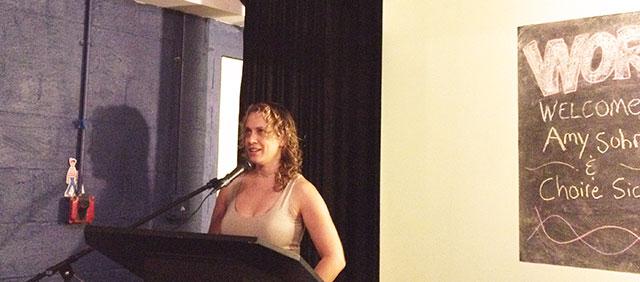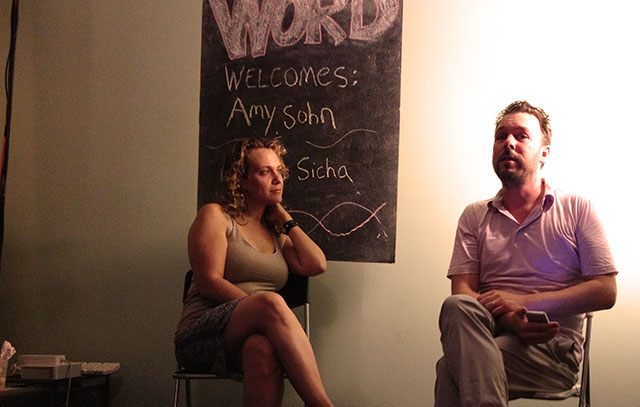
WORD Bookstore hosted Amy Sohn to talk about her latest novel, The Actress, (July 2014), with Choire Sicha, co-proprietor of The Awl. Sohn provided pierogies from a neighborhood restaurant and Sicha set the mood as casual, insisting members of the audience should call out questions or comments they pair could answer or refute.
Fifteen years ago, Sohn debuted her novel Run Catch Kiss about a twenty-something sex columnist, she, herself, also then a twenty-something sex columnist. Her third and fourth novels revealed her own maturity focusing on the parent-inundated neighborhood of Park Slope, Brooklyn. In Prospect Park West and Motherland, she examined the lives of a collection of upper middle-class parents, mostly women, with a probing sarcasm suggesting that these people all took themselves far too seriously. The characters feel real, avoiding the pitfalls of camp by relying on Sohn’s wit to critique their pettiness, narcissism, and indulgences.
In The Actress, Sohn has moved beyond the Park Slope politics of parenting, instead examining popular culture, celebrity, and deceit. The novel’s namesake, young actress Maddy Freed, stars in and co-writes a film with her soon to be ex-boyfriend. At a film festival, she meets and is seduced by a film star, Steven Weller. Steven has hints of leading men like Tom Cruise, George Clooney, John Travolta. Maddy’s career remains on the rise as long as she’s with him, while her ex-boyfriend continues with famous actress.
The idea began with a desire to capture the zeitgeist of celebrity culture. Sohn sees The Actress as an homage to Henry James’s The Portrait of a Lady.
“I think Henry James sucks,” Sicha interjects, describing his writing as too stagey and elbowy, then backing away slightly saying that mostly pertained to his later work.
Sohn’s choice of subject though is proving prescient. By coincidence, since undertaking the writing of the book, a lot of celebrities have outed themselves. Others have divorced. Others have become engaged. Sexual orientation questions can be delicate to navigate, though. “The only concern was doing it the right way,” Sohn says.
Really though, the celebrity elements served more as setting and a backdrop to deeper questions. Sohn wanted to focus on the fear of adultery, on infidelity and deception. The novel isn’t about being openly gay or not, but rather about the acts of deception and the consequences.
Twenty-something Maddy thinks of herself as more evolved, more mature than she actually is. She thinks she is more progressive. These internal conflicts were Sohn’s objective. Sohn sees this as a product of Maddy being in her twenties.
Sicha speculates though these are the conditions of a generational gap, that Maddy represents a Millennial outlook. He and Sohn are squarely Generation X.
“I don’t know them well enough,” Sohn says of Millennials. Still, she sees there is “this real niceness” now among the generation.
The novel, like a good Hollywood film, had more than one ending. Sohn said she had many different ideas–suicide, murder. Unlike in the era of Henry James, none of the endings had anyone dying of consumption.
Sohn began her career writing for New York Press just after college. She worked her way through various alternative publications. “I’m definitely NYC, not MFA.” She and other writers of the time would drink a lot after hours. “It was like The Breakfast Club.”
She soon had a sex column, “Ask Amy,” where she wrote about dates with men and offered advice. She says her advice was horrible and made no sense. “I was a hapless date,” she says, adding, “Dan Savage is a genius.”
She received all sorts of correspondence. Sicha read some of the hate mail published in the paper. Often the attacks were personal. She says sometimes she would weep, “mainly because I was thinking about my parents reading them.”
“It took me five years to realize you can’t grab someone by the neck and make them go on a second date,” she says.

Today, when writers from the internet write books, critics suggest they are just blogging on paper, Sicha says. He asks about Sohn’s transition from newspapers to novels.
At the time, Sohn never expected to see her career turn towards books. She wasn’t the first columnist to write a book, but the problem was that she wrote graphically about sex. Run Catch Kiss was about twenty-something written by a twenty-something, and then it was a reviewed by a fifty-something man. There was a disconnect there. Still, she rather have someone older reviewing her books rather than a competitive peer hoping to one up her with a negative review. “Sometimes the person you think is going to slam it, doesn’t,” she says.
“I never felt I had the stamp of ‘Literature,'” Sohn says. Of course people who write literature often end up complaining. Writers of ‘Literature’ often end up teaching. They complain about teaching, about never having enough money. Sohn sees it as problem that goes both ways. Commercially successful authors want literary credibility and literary authors want the popular cultural and financial rewards. The Actress perhaps will change that. Sohn sees it as more literary, and marketing for the book suggests as much.
Amy Sohn and Choire Sicha
Tuesday, July 15, 2014
WORD Bookstore (Brooklyn)